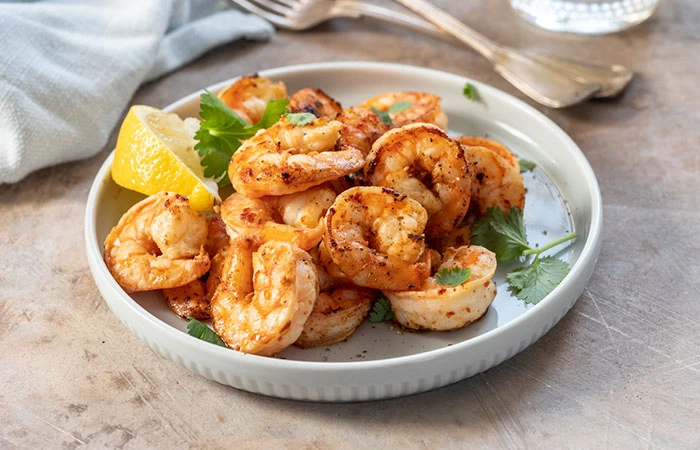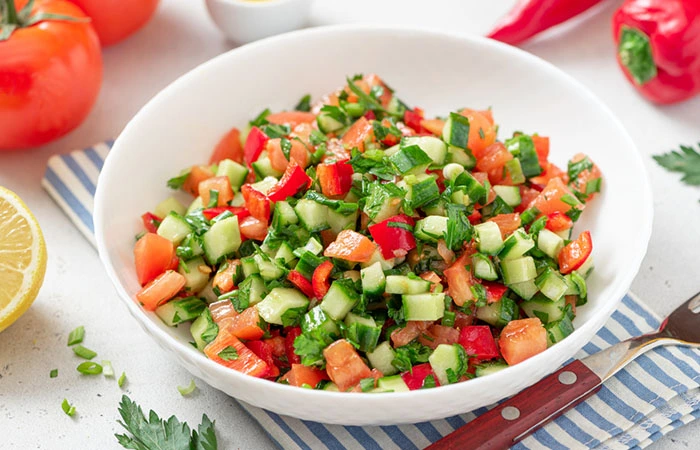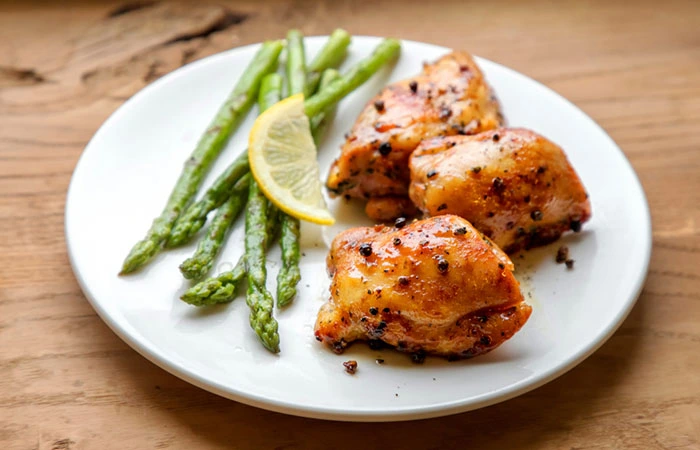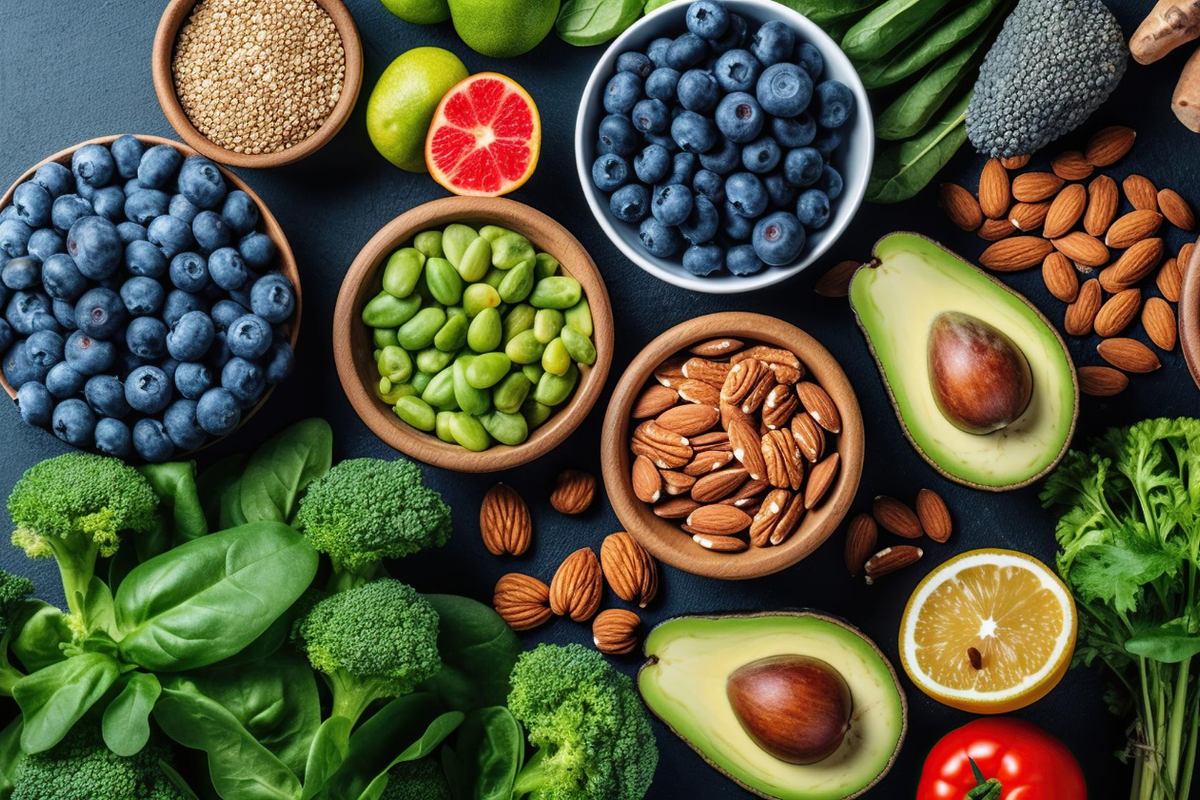The hCG diet is a controversial weight loss plan that involves eating very few calories (500-800 kcal/day) and taking hCG hormone supplements or injections. The proponents of this diet claim that it can help you lose weight quickly and reset your metabolism. However, there is no scientific evidence to support these claims and the use of hCG products for weight loss is illegal and unsafe (1 ), (2).

The U.S. FDA has approved hCG as a prescription drug for treating infertility, but not for weight loss. The use of hCG products for this purpose may pose serious health risks, such as blood clots, blood vessel blockage, nutritional deficiencies, muscle loss, fatigue, edema, irritability, and weight regain. Moreover, experts say that the weight loss on this diet is not due to hCG hormone supplement, but to the severe calorie restriction. This article will examine the facts and myths about the hCG diet and its effects on health and weight loss. Read on to find out more.
At A Glance: The hCG Diet
- Principle: A diet that combines extreme calorie restriction (500-800 kcal/day) and the use of hCG hormone supplements or injections
- Purpose: Rapid weight loss
- Who It Is For: People who want to lose weight fast, often under medical supervision
- Duration: Short-term
- Who Should Avoid: Pregnant or breastfeeding women, people with eating disorders, nutritional deficiencies, and problems related to the heart, kidney, liver, or other serious health conditions, and those taking certain medications
- Cons: May increase the risk of blood clots or blood vessel blockage, and cause nutritional deficiencies, muscle loss, fatigue, edema, irritability, and weight regain
What Is hCG?
Human chorionic gonadotropin (hCG) is a hormone that is produced by the placental tissues during pregnancy. It stimulates the production of other hormones, such as estrogen and progesterone, that help prepare and maintain the uterus for pregnancy and fertilize the egg. Additionally, hCG can be used to diagnose some types of cancer, such as choriocarcinoma, which is a rare cancer that affects the uterus or ovaries (3). The levels of hCG change throughout the pregnancy and reflect its different stages. In this article, we will explain the functions of hCG in the human body.
How The hCG Hormone Functions In The Body
Pregnancy is a transformative journey, and at its core lies the human chorionic gonadotropin (hCG) hormone, a pivotal player in the development and maintenance of this miraculous process.
1. Helps Confirm Pregnancy
The journey begins with the detection of hCG, a hormone emanating from the placenta, the vital link between mother and baby. Detectable in blood or urine samples, the presence of hCG signifies the growth of an embryo in the womb. Medical professionals utilize hCG levels not only to confirm pregnancy but also to monitor its progression, identifying potential complications like ectopic pregnancy or miscarriage.
2. Helps Maintain Early Pregnancy
Beyond confirmation, hCG plays a crucial role in nurturing the early stages of pregnancy. It stimulates the production of progesterone, an essential hormone for the embryo’s health. Progesterone, in turn, nourishes and protects the uterine lining, ensuring a conducive environment for embryo implantation and development. The hCG hormone acts as a guardian, maintaining stable progesterone levels during the critical first trimester when the risk of pregnancy loss is most significant.
3. Improves Fetal Tolerance
Remarkably, hCG goes beyond mere confirmation and maintenance. It exhibits an immunomodulatory effect, regulating the immune system to prevent it from attacking the foreign cells of the developing baby. By promoting the generation of specialized immune cells known as Treg cells, hCG suppresses inflammation and safeguards the fetus from rejection. Additionally, it enhances blood flow and nutrient delivery to the placenta and fetus, ensuring optimal growth and development.
4. Helps Treat Infertility
For women facing fertility challenges, hCG hormone injections, alongside other fertility drugs, may be prescribed. These injections stimulate ovulation, the release of an egg from the ovary, while also enhancing the quality and quantity of eggs. Studies indicate that a dose of 200 IU of hCG can effectively improve ovarian function and enhance pregnancy outcomes, offering hope to those struggling to conceive.
What Is The hCG Diet?
The hCG diet is a controversial weight loss method that involves eating very few calories (between 500 and 800 per day) and taking the hCG hormone, either by injection or by mouth. The hCG hormone is produced by pregnant women and is supposed to help with fat burning, appetite control, and metabolism. The diet was created by Dr. Albert Simeons, a British doctor who published his findings in 1954. He claimed that the diet could help people lose up to a pound a day, especially from stubborn areas like the abdomen, hips, and thighs (8).
However, the diet has been widely criticized and debunked by experts and authorities (9). There is no scientific evidence that the hCG hormone has any effect on weight loss or fat distribution. The diet is also very risky and unhealthy, as it can cause severe side effects such as malnutrition, gallstones, blood clots, and hormonal imbalances. The following section will explain the logic behind this diet and why it is not recommended.
What You Need To Know About The hCG Diet
If you are looking for a quick and effective way to lose weight, you might have heard of the hCG diet. This diet claims to help you shed pounds by combining a very low-calorie diet with hormone supplements. But how does it work and is it safe? Here are some facts you should know before trying this diet.
The hCG diet consists of three main phases:
- Phase 1: Loading phase. You eat high-calorie foods for two days and start taking hCG supplements.
- Phase 2: Weight loss phase. You reduce your calorie intake to 500-800 calories per day and continue taking hCG supplements. You follow this phase for 3 to 6 weeks, depending on your weight loss goal.
- Phase 3: Maintenance phase. You gradually increase your calorie intake and stop taking hCG supplements. You avoid starches and sugars for three weeks.
The hCG supplements are supposed to boost your metabolism and help you burn fat from areas where it is hard to lose, such as the abdomen and thighs. The supplements can be administered by injection, drops, or pills under medical supervision.
The food choices on the hCG diet are limited to lean proteins, vegetables, and some fruits and grains. You are not allowed to consume any fats, oils, dairy products, or alcohol. You also have to drink plenty of water and avoid exercise.
The hCG diet may help you lose weight quickly, but it also has some drawbacks. The main one is that the weight loss is mostly due to the extreme calorie restriction, not the hCG hormone. There is no scientific evidence that hCG supplements have any effect on weight loss or fat distribution (10). Moreover, the diet can cause side effects such as fatigue, hunger, headache, nausea, and mood swings. It can also increase the risk of blood clots, gallstones, electrolyte imbalance, and hormonal imbalance.
Therefore, before starting the hCG diet, you should consult your doctor and weigh the pros and cons carefully. The hCG diet is not a long-term solution for weight management and may not be suitable for everyone. A balanced diet and regular exercise are still the best ways to achieve a healthy weight and lifestyle.
Advantages Of The hCG Diet
1. May Aid In Weight Loss
The hCG diet is a low-carbohydrate, low-calorie diet that involves taking injections or drops of human chorionic gonadotropin (hCG), a hormone produced during pregnancy. The diet claims to help you lose up to 1-2 pounds per day by boosting your metabolism and reducing your hunger. However, the weight loss may be mostly due to the severe calorie restriction, not the hCG hormone. There is no scientific evidence that hCG has any effect on fat loss or appetite suppression (10), (11).
2. May Help Suppress The Appetite
One of the benefits of a low-carb diet is that it may increase your satiety, meaning you feel more satisfied and less likely to overeat. This may help you stick to the hCG diet, which limits your daily calorie intake to 500-800 calories. Some proponents of the hCG diet also believe that the hormone helps curb your appetite by affecting your brain chemistry. However, this claim is not supported by any reliable research.
The hCG diet consists of three phases. The following section will explain each phase in detail.
Unraveling the Phases of the hCG Diet
1. The Loading Phase: Preparing for the Caloric Shift
Embarking on the hCG diet necessitates a structured approach, beginning with the Loading Phase. This initial stage spans two days, serving as a crucial prelude to the forthcoming calorie restriction. During this window, indulge in high-calorie, high-fat foods such as cheese, butter, nuts, chocolate, and fried delicacies. Simultaneously, initiate the intake of hCG supplements, available in the form of injections or drops.
2. The Calorie-Restricted Phase: Navigating the Core of the Diet
The heart of the hCG diet lies in the Calorie-Restricted Phase, extending for a duration of 3 to 6 weeks, contingent on individual weight loss goals. Within this phase, stringent calorie control becomes paramount, limiting daily intake to a mere 500-800 calories. Remarkably, exercise is not a mandatory component during this period.
Structured meal plans are integral, with two meals per day—typically lunch and dinner. Each meal should encompass a protein source, a vegetable, a fruit, and a breadstick or cracker. While hydration is encouraged through water, coffee, and tea, sugar and alcohol remain on the list of forbidden indulgences.
3. The Maintenance Phase: Transitioning to Sustainable Habits
Having achieved the desired weight, the hCG diet gracefully transitions into the Maintenance Phase, spanning a period of 3 weeks. During this interval, a gradual increase in calorie intake is sanctioned, ranging from 1500-2000 calories daily. Notably, this phase signals the cessation of hCG supplements.
As dietary variety expands, a cautionary note is sounded against starches and sugars during the initial two weeks. The Maintenance Phase encapsulates the consolidation of healthy habits, ensuring that the achieved weight loss is sustained over the long term.
Foods To Eat And Avoid On The hCG Diet
Foods To Eat
The hCG diet, renowned for its structured approach to weight loss, meticulously outlines approved foods for each phase. Let’s delve into the dietary choices that align with the hCG diet’s principles.
Loading Phase
During the Loading Phase, indulge in high-fat foods to prepare for the upcoming calorie restriction. Approved foods include:
- Eggs
- Bacon
- Avocados
- Salmon
- Nuts
Calorie-Restricted Phase
The core of the diet emphasizes lean proteins, vegetables, fruits, and controlled carbohydrate intake. Approved foods include:
Lean Proteins:
- Chicken
- Turkey
- Lean cuts of beef (tenderloin or sirloin), pork, and lamb
- Veal
- Whitefish
- Shellfish
Vegetables:
- Spinach
- Lettuce
- Cabbage
- Tomatoes
- Asparagus
- Cucumbers
- Celery
- Broccoli
- Cauliflower
- Green beans
- Radishes
- Bell peppers
- Onions
- Zucchini
- Brussels sprouts
Fruits:
- Apples
- Strawberries
- Oranges
- Grapefruit
- Berries (blueberries, raspberries)
Carbohydrates:
- Grissini breadsticks (in limited quantities)
- Melba toast
Beverages:
- Water
- Coffee
- Tea
Condiments And Seasonings:
- Salt
- Pepper
- Mustard
- Vinegar
- Garlic
- Basil
- Parsley
- Thyme
- Oregano
- Cayenne pepper (for added flavor)
- Stevia (as a sugar substitute, in moderation)
Maintenance Phase
The Maintenance Phase maintains the same food list, with a focus on increasing quantity while avoiding starches and sugars for the initial two weeks.
Foods To Avoid
The hCG diet equally emphasizes foods to steer clear of during the Calorie-Restricted Phase:
Starchy Vegetables And Grains:
- Potatoes
- Sweet potatoes
- Corn
- Peas
- Rice
- Pasta
- Quinoa
- Oats
Sugary Foods:
- Candy
- Chocolate
- Ice cream
- Pastries
- Cookies
- Sugary cereals
Fatty Foods And Dairy:
- Avocados
- Nuts and seeds
- Oils
- Butter
- Full-fat dairy (cheese, cream, whole milk, yogurt)
Processed Or Fatty Meats:
- Fatty cuts of beef (ribeye steak)
- Dark meat poultry (chicken thighs)
- Pork cuts like bacon or sausage
Processed And Fried Foods:
- Fast foods
- Chips
- Fried chicken
- Any foods deep-fried in oil
Condiments And Sweeteners:
- Mayonnaise
- Ketchup
- Honey
- Maple syrup
- Regular table sugar
- Agave nectar
Fruits:
- Bananas
- Grapes
- Pineapple
- Mangos
- Dried fruits like raisins or dates
Beverages:
- Soda
- Fruit juices
- Sugary drinks
- Energy drinks
- Sweetened iced teas
- Alcoholic beverages
Sample hCG Diet Meal Plan
The Loading Phase
| Breakfast | 1 bowl of overnight Greek yogurt oatmeal with toppings (almonds, walnuts, or berries) 1 banana |
| Lunch | Beef burrito (175g) |
| Snack | 1 small apple A handful of nuts |
| Dinner | 1 small apple A handful of nuts |
The Calorie-Restricted Phase
| Breakfast | 1 cup of herbal tea or unsweetened black coffee |
| Lunch | 100g of grilled chicken breast 1 small bowl of mixed green salad with a squeeze of lemon juice 100g of steamed asparagus |
| Snack | A small apple or half a grapefruit |
| Dinner | 100g of white fish filet 100g of steamed spinach with a squeeze of lemon A few cherry tomatoes |
The Maintenance Phase
| Breakfast | 1 bowl of blueberry and almond quinoa smoothie |
| Lunch | 1 bowl of Kale and Brussels sprout salad 85g of salmon sauteed in olive oil |
| Snack | A small apple or half½ grapefruit A handful of almonds a grapefruit |
| Dinner | 1 smoked salmon sandwich 100g of boiled broccoli |
Remember, adherence to approved food lists is crucial for each phase, ensuring the effectiveness of the hCG diet.
Easy Recipes For The hCG Diet
Grilled Lemon Garlic Shrimp

Ingredients:
- 200g of shrimp (about 10-12 large shrimp), peeled and deveined
- 2 cloves of garlic, minced
- Juice of 1 lemon
- ½ teaspoon of lemon zest
- Salt and pepper to taste
- Fresh parsley for garnish (optional)
How To Prepare:
- Combine minced garlic, lemon juice, lemon zest, salt, and pepper in a bowl.
- Add shrimp to the marinade and let them sit for about 5-10 minutes.
- Preheat grill or grill pan to medium-high heat.
- Thread marinated shrimp on skewers.
- Grill shrimp for about 2-3 minutes per side until cooked through.
- Serve with a garnish of fresh parsley.
Tomato And Cucumber Salad

Ingredients:
- 2 medium-sized tomatoes, diced
- 1 cucumber, peeled and diced
- ¼ cup of red onion, thinly sliced
- 2 tablespoons of apple cider vinegar
- Stevia or preferred sugar substitute to taste
- Salt and pepper to taste
- Fresh basil leaves for garnish (optional)
How To Prepare:
- Combine diced tomatoes, diced cucumber, and sliced red onion in a bowl.
- Mix apple cider vinegar, stevia (to taste), salt, and pepper to create dressing in a separate bowl.
- Drizzle dressing over tomato, cucumber, and onion mixture and toss to coat.
- Garnish with fresh basil leaves.
- Refrigerate for at least 30 minutes before serving.
Grilled Chicken With Steamed Asparagus

Ingredients:
- 100g of skinless chicken breast
- 100g of asparagus
- 1 tablespoon of lemon juice
- Salt and pepper to taste
How To Prepare:
- Season chicken breast with salt, pepper, and a splash of lemon juice.
- Grill chicken for approximately 6-7 minutes on each side or until fully cooked.
- Steam as
paragus for 4-5 minutes or until tender in a steamer.
- Serve chicken with asparagus and an extra squeeze of lemon.
Spiced Shrimp And Spinach

Ingredients:
- 100g of shrimp
- 100g of fresh spinach
- 1 clove of Garlic (minced)
- ¼ tablespoon of paprika
- Cayenne pepper (a pinch)
- Salt to taste
How To Prepare:
- Sauté minced garlic using a splash of water until fragrant in a non-stick pan.
- Add shrimp, and season with paprika, cayenne, and salt.
- Cook until shrimp turn pink and are cooked through.
- Serve over fresh spinach.
Baked White Fish With Zucchini

Ingredients:
- 100g of white fish filet
- 100g of zucchini (sliced)
- Fresh herbs like thyme or dill
- Salt and pepper to taste
How To Prepare:
- Preheat oven to 375°F (190°C).
- Place fish filet on a baking sheet.
- Season with herbs, salt, and pepper.
- Arrange zucchini slices around fish.
- Bake for 15-20 minutes or until fish is cooked through and zucchini is tender.
- Serve hot.
The recipes align with hCG diet guidelines, emphasizing lean proteins, non-starchy vegetables, and portion control. Always consult with a registered nutritionist before making significant dietary changes.
Quick Tip: Managing Sleep for Weight Maintenance
Sleep deprivation may impede weight loss goals. Aim for 7-8 hours of quality sleep nightly to support healthy weight management.
Potential Side Effects Of The hCG Diet
While the hCG diet promises rapid weight loss, it comes with potential side effects that warrant consideration.
1. May Lead To Muscle Loss
The severe calorie restriction (500-800kcal) may contribute to skeletal muscle loss, weakening muscles and increasing the risk of cardiovascular diseases.
2. May Cause Nutritional Deficiencies
Prolonged adherence to such a low-calorie diet may lead to nutrient deficiencies, impacting health, and immune function.
3. May Cause Weight Regain
Deprivation during the diet may trigger hunger pangs, leading to overeating and potential weight gain.
4. May Reduce Bone Density
Lack of calcium-rich foods during the diet may result in reduced bone density, increasing the risk of osteoporosis and fractures.
In conclusion, while the hCG diet offers a structured approach to weight loss, potential risks and concerns highlight the importance of consulting healthcare professionals before embarking on such a restrictive diet. Exploring safer, evidence-based alternatives ensures long-term health goals are met.
Sources
Articles on TrueLiving are backed by verified information from peer-reviewed and academic research papers, reputed organizations, research institutions, and medical associations to ensure accuracy and relevance.
- Avoid Dangerous HCG Diet Products
U.S. Food & Drug Administration
https://www.fda.gov/consumers/consumer-updates/avoid-dangerous-hcg-diet-products - HCG: Yet another fraudulence
https://www.ncbi.nlm.nih.gov/pmc/articles/PMC3425177/ - Human Chorionic Gonadotropin
StatPearls
https://www.ncbi.nlm.nih.gov/books/NBK532950/ - hCG: Biological Functions and Clinical Applications
International Journal of Molecular Sciences
https://www.ncbi.nlm.nih.gov/pmc/articles/PMC5666719/ - Physiology, Chorionic Gonadotropin
StatPearls
https://www.ncbi.nlm.nih.gov/books/NBK556118/ - Human Chorionic Gonadotropin as a Pivotal Endocrine Immune Regulator Initiating and Preserving Fetal Tolerance
International Journal of Molecular Sciences
https://www.ncbi.nlm.nih.gov/pmc/articles/PMC5666847/ - Successful pregnancies in patients with estrogenic anovulation after low-dose human chorionic gonadotropin therapy alone following hMG for controlled ovarian hyperstimulation
https://pubmed.ncbi.nlm.nih.gov/15807221/ - [Risk-benefit analysis of a hCG-500 kcal reducing diet (cura romana) in females]
https://pubmed.ncbi.nlm.nih.gov/3609673/ - Evidence for, and Associated Risks with, the Human Chorionic Gonadotropin Supplemented Diet
https://pubmed.ncbi.nlm.nih.gov/27010890/ - Does the “HCG diet” provide additional weight loss compared with a low-calorie diet alone?
https://journals.lww.com/ebp/citation/2020/12000/does_the__hcg_diet__provide_additional_weight_loss.25.aspx - Low-Carbohydrate Diet
StatPearls
https://www.ncbi.nlm.nih.gov/books/NBK537084/ - Stress and Obesity: Are There More Susceptible Individuals?
https://www.ncbi.nlm.nih.gov/pmc/articles/PMC5958156/ - Sleep Deprivation: Effects on Weight Loss and Weight Loss Maintenance
https://www.ncbi.nlm.nih.gov/pmc/articles/PMC9031614/ - https://www.ncbi.nlm.nih.gov/pmc/articles/PMC8308821/
- Diet and body composition. Effect of very low calorie diets and exercise
https://pubmed.ncbi.nlm.nih.gov/1784876/ - Micronutrient deficiency in obese subjects undergoing low calorie diet
Nutrition Journal
https://www.ncbi.nlm.nih.gov/pmc/articles/PMC3404899/ - Appetite regulation and weight control: the role of gut hormones
Nutrition & Diabetes
https://www.nature.com/articles/nutd201121 - The use of calcium and vitamin D in the management of osteoporosis
Therapeutics and Clinical Risk Management
https://www.ncbi.nlm.nih.gov/pmc/articles/PMC2621390/
Was this article helpful?








